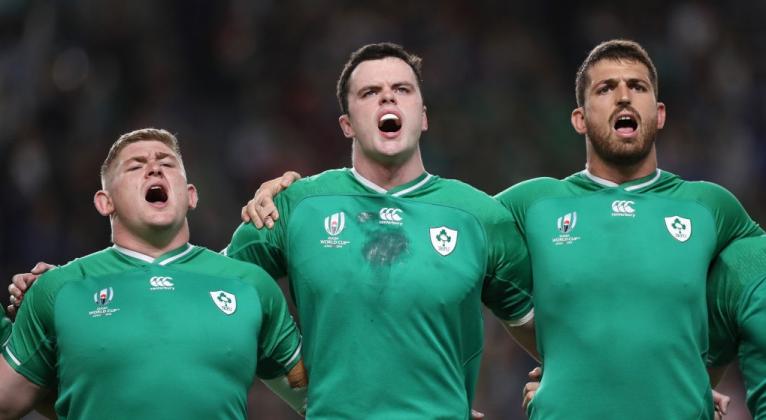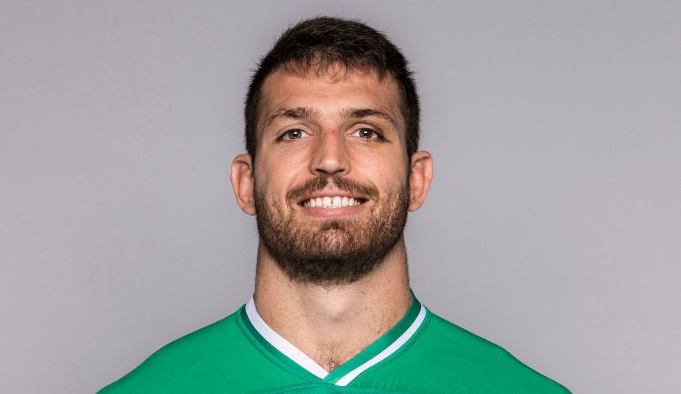What Kleyn's selection really says about the Springboks

“It will always be different, you know, it’s your home country.” Jean Kleyn spoke for all South Africans on Wednesday when he was asked to encapsulate his emotions three days out from his Springboks debut.
He has of course already sat at the top table of a press conference as a Test rugby player. In October 2019, a month out from a World Cup that South Africa would win, Kleyn was part of Joe Schmidt’s Ireland team.
He’d been living in the country since 2016 and had shone in Munster’s second row. His was another chapter in an expansive story of South African-born rugby players proudly representing another nation. Pure market capitalism. The global village. No hard feelings.
On Saturday he’ll pull on a different green jersey and sing a different national anthem, one he learned as a boy and which will stir a deeper part of his soul. Call it oversight from Andy Farrell. Call it a stroke of genius from Jacques Nienaber and Rassie Erasmus. Cite an injury crisis at lock. Credit fate if you like. Whatever the reason, a 29-year-old from Johannesburg is finally, almost miraculously, right where he belongs.
“Obviously it was a great honour to play for Ireland as well but I didn’t grow up as a young boy watching Paul O’Connell play rugby thinking ‘jeez, I want to play in his jersey’,” Kleyn added. “I was watching Bakkies Botha run around smashing guys and thinking ‘one day, one day’.
“So, you know, it’s very much a childhood dream coming true and here I am sitting here where I never thought I’d get the opportunity.”
According to a consensus in 2020 – the latest data available – there are more than 915,000 South Africans living abroad. Anecdotally, the actual number is likely a lot higher and could be much closer to one million. Around a third live in the UK and Ireland.
Every one of them will have their reason for leaving. Some left for work opportunities, perhaps sensing that their path to a fruitful career back home was strewn with difficulty and uncertainty. Others relocated for love or the pursuit of a fresh start. Some, sadly, packed their bags in the hope of a more peaceful life as they turned their back on a land that is unquestionably fraught with danger.
But every one of them, even those who hate South Africa’s politicians, culture wars and crumbling state services, remain tethered to their homeland. You can remove the trunk and branches, but some roots cannot be pried from the earth so easily.
Kleyn’s words – honest, moving, relatable – shattered an unspoken bond that too many expats steadfastly hold. It’s impolite to yearn for what’s been abandoned. Overt expressions of love for South Africa instantly opens oneself up to accusations of hypocrisy. “If you love the place so much,” say the snide Brits, Irish, Australians, Canadians and Kiwis, “then why did you leave?”
It’s a valid question. Only, there is no neat answer. It’s complicated. We’re complicated. The world is complicated. Many of us wish we lived on a timeline that had access to the multiverse. We wish we could earn our pounds and enjoy the benefits of the NHS and safe suburbs without electric fences but also swim in warm waters, hike up Table Mountain and braai with our parents. We want our vetkoek and we want to eat it too. Except we can’t.

Kleyn can. And there is not a single South African expat who didn’t see something recognisable in his heartfelt address.
Nienaber and Erasmus deserve credit as there’s more at play here than just a feel-good narrative for a forgotten sun of the red-brown soil. The Springboks have always leaned into their own mythology. Self aggrandising perhaps, but it’s worked. This means more, or so the mantra goes. Francois Pienaar. Chester Williams. Siya Kolisi. Makazole Mapimpi. Statesmen or rugby players? In South Africa the lines between the two are paper thin.
Kleyn’s inclusion and his rousing words could serve as a booster shot in the arm three months out from their World Cup title defence. “Playing for the Springboks comes with a big responsibility,” he said, echoing a party line that borders on the fanatical and turns athletes into zealots.
“The Boks give hope to a lot of people, so when you wear the jersey, the country’s hopes and dreams rest on your shoulders.”
Though this has been a well-trodden path, there are also signs that the Springboks are an outfit in a constant state of evolution. Kleyn’s selection would have been inconceivable only five years ago. Once the Springboks were a closed shop. Foreign based exports effectively entered a lobster trap overseas from which they could never escape. A precedent has been set. Now the door is open. No one will ever be truly forgotten.
Then again, change shouldn’t come as a surprise to those who have been paying attention. During last year’s Autumn internationals, Willie le Roux and Damian Willemse steered a backline that was unrecognisable from previous iterations. They were fluid and spontaneous. Right angles were softened into aesthetically pleasing curves. Second receivers and dummy runners and skipped passes and goose steps were ubiquitous. They lost to Ireland and France but showed a spark to match their grunt. Write this team off at your own peril.
That evolution continues on Saturday with Manie Libbok starting at 10 for the first time. His enterprising play with the Stormers has been one of the more uplifting stories in South African rugby over the past 18 months. Lukhanyo Am returns to the midfield. Kurt-Lee Arendse and Canan Moodie occupy both wings. Le Roux will call the plays from the back field. Andre Esterhuizen, so much more than a battering ram, will prowl off Libbok’s shoulder. Cobus Reinach, the fastest scrumhalf in the game, will feed him the ball.
Have the Springboks ever named a more exciting back line? There have been more accomplished units, for sure, but this is a cluster bursting with talent and potential. Nienaber made his name as a defensive expert and is now expanding his repertoire as a coach who can unleash hot-steppers and passing dazzlers. On and off the field the Springboks continue to progress. No wonder there’s a brewing sense of optimism both at home and abroad.



















































Fantastic article! Well written and captures perfectly the situation that South Africans are in - both those that stay and those that have relocated.
I wouldn’t brag about the NHS, unless you compare it to public service in SA or Haiti.
Misstep by Farrell. Top teams need five or six good options at lock (and prop), to manage through injuries, bans, retirements, game time, rotations etc.
Credit to Rassie and Jacques for building depth in all positions in the last 18 months. And they have the utility roles covered too. Getting Kleyn on board is a ninja move that expands the second row group to include Etzebeth, De Jager, Mostert, RG, Orie and now Kleyn. That's a pretty strong engine room. Front row depth also not too shabby.
It's kind inspiring in a not very comfortable way to think that the Books might move to the sort fast attacking game I love to see NZ play... Books are evolving. I thought that Kolosi became captain. Big moment and a great one. I can almost wish them luck...
Spot on!
I know it is unfair, but I struggle with former South Africans sitting abroad and writing about the South African rugby perspective. You can write about the expat perspective, but I don't think you get to speak on behalf of South African rugby fans when you are living the British life. You will have more integrity in supporting and writing about England rugby.